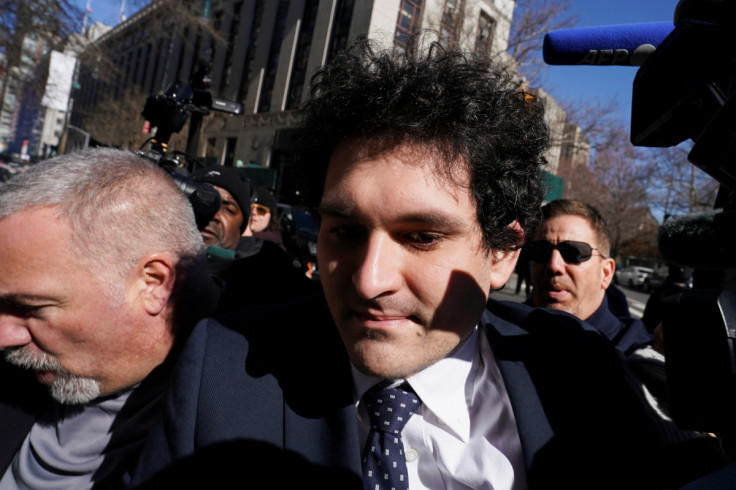Is Bankman-Fried The Luckiest One? DOJ Reveals Plan To Not Pursue Additional Charges

KEY POINTS
- Bankman-Fried's camp asked the court to delay the sentencing process last month, citing a potential second trial in March
- SBF currently faces over 100 years in prison after being convicted on seven counts of fraud
- His sentencing is on March 28
The U.S. Department of Justice's decision to not pursue additional charges against Sam Bankman-Fried, who was found guilty of seven counts of fraud in November, has received widespread criticism from prominent figures within the cryptocurrency space.
The 31-year-old MIT graduate, once regarded as the "golden boy of cryptocurrency," must be the luckiest one in today's legal sphere as he will no longer face additional charges.
Bankman-Fried, popularly known as SBF, was expected to be prosecuted on six additional charges in a separate trial. The additional charges include unlawful political campaign contributions, conspiracy to commit bank fraud, substantive securities and commodities fraud, conspiracy to operate an unlicensed money-transmitting business and charges of conspiracy to bribe foreign officials, which was added following a superseding indictment in March. Prosecutors have now dropped the plan.
"The government respectfully submits this letter to provide notice to the court and the defendant that it does not plan to proceed with a second trial in the above-captioned matter," U.S. prosecutors said in a court filing last Friday.
"As explained below, much of the evidence that would be offered in a second trial was already offered in the first trial and can be considered by the court at the defendant's March 2024 sentencing. Given that practical reality and the strong public interest in a prompt resolution of this matter, the government intends to proceed to sentencing on the counts for which the defendant was convicted at trial," the prosecutors added.
The US Government announced they're no longer plan to pursue six additional charges against SBF pic.twitter.com/l2waUIKLKy
— techcentrik™ (@nicaIBTimes) January 1, 2024
Several crypto personalities have criticized the prosecution's decision.
Coinbase's chief legal officer, Paul Grewal, called the decision "a mistake" and a "miscarriage of justice."
"The public interest in a public airing of charges almost always matters. Campaign finance charges are at the very top of this list. What politicians and others knew what and when are critical questions that deserve answers," he said. "Dropping this on a Friday night before a holiday only fuels public cynics about the politics of all this. Damn shame."
A few thoughts on the DOJ’s decision not to pursue campaign finance charges against SBF. Tl;dr: I think it’s a mistake. 🧵⬇️
— paulgrewal.eth (@iampaulgrewal) December 30, 2023
Crypto Law founder and Ripple lawyer John Deaton noted the decision has turned the DOJ into a joke.
"Ask yourself why is this case being dropped in an election year. During the fraud trial, Caroline Ellison testified that SBF gave the Biden administration $10 million and the reason he told her was to 'buy access.' He got two personal meetings with [Securities and Exchange Commission chairman] Gary Gensler and several others with SEC staff ... What a joke the DOJ has become," Deaton tweeted.
Ask yourself why is this case being dropped in an election year? During the fraud trial Caroline Ellison testified that SBF gave the Biden Administration $10 Million and the reason he told her was to “buy access.” He got two personal meeting with @GaryGensler, and several others… https://t.co/f4KL5MJgwb
— John E Deaton (@JohnEDeaton1) December 30, 2023
However, according to Damian Williams, the U.S. attorney for the Southern District of New York, "a second trial would not affect the United States Sentencing Guidelines range for the defendant, because the court can already consider all of this conduct as relevant conduct when sentencing him for the counts that he was found guilty of at the initial trial."
The latest development puts the ball in Judge Lewis Kaplan's court, who presides over Bankman-Fried's case.
SBF currently faces over 100 years in prison after being convicted on seven counts of fraud. His sentencing is scheduled for March 28.
Last month, Bankman-Fried lost another battle as a court denied his request to delay a pre-sentencing interview and extend his sentencing process.
The judge at the time denied the motion and said the sentencing could be delayed if the DOJ decides to proceed with a second trial on bank fraud and other charges.
© Copyright IBTimes 2024. All rights reserved.






















